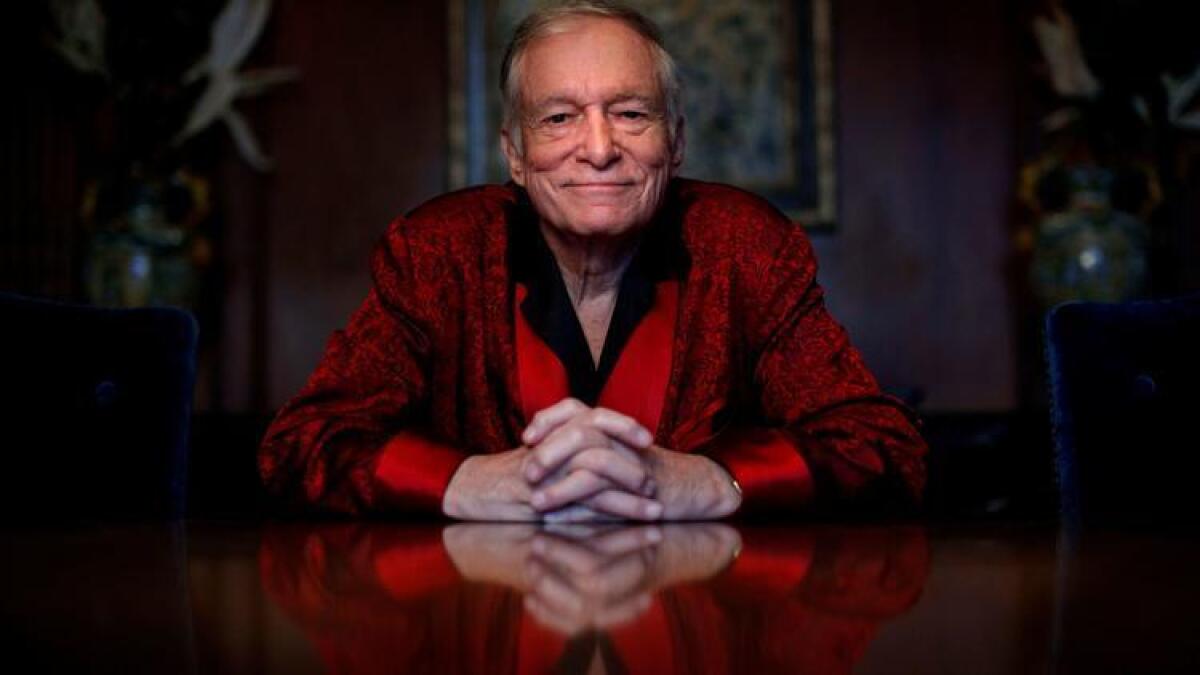Opinion: Was Hugh Hefner a sexist, or wasn’t he? Readers on the essential question about the Playboy founder

Playboy founder Hugh Hefner, seen here at his Holmby Hills mansion in 2010, died at the age of 91 on Sept. 27.
- Share via
It’s not exactly news that Hugh Hefner, the perpetually robed Playboy founder who died Wednesday at the age of 91, is a polarizing figure. For decades Americans have disagreed about whether he should be remembered as a great liberator of Americans from their sexual puritanism or as a sexist exploiter of women.
On Thursday, columnist Robin Abcarian came down strongly on the latter side, writing that although we shouldn’t forget Hefner’s support for smart journalism, reproductive rights and civil liberties, we should also not lose sight of the fact that his core business was the objectification of women — mostly women under 30 — and the exalting of exclusively male fantasies.
Before Abcarian’s column was published, the letters on Hefner’s death reflected the typical mix of opinions we get after most notable celebrity passings: Several mentioned the existence of strong polarization over Hefner’s work without taking a side, others reflected dispassionately on his work, and a few recounted their own experiences with Hefner. It was only in response to Abcarian’s column that more readers started expressing stronger opinions on Hefner’s work itself.
I wonder if Hefner ever thought about the destruction he may have caused by promoting to men they were entitled to hedonism.
— Robin Provart-Kelly, Culver City
Here is what they said.
Robin Provart-Kelly of Culver City wonders how much Playboy may have influenced her own father:
Props to Abcarian for her article on Hefner. I read with disgust in other pieces about his Playboy Clubs, starting in the 1950s Chicago, and his interest in jazz and felt like they were describing my father’s life.
I could not help but wonder if the evisceration and abandonment of my own family started there for my dad, in Chicago before he moved us to L.A. and unceremoniously dumped us. He was a lifelong subscriber to the magazine.
I wonder if Hefner ever thought about the destruction he may have caused by promoting to men they were entitled to hedonism and not responsible to the people they had spawned.
The only thing Hefner should be lauded for is his business acumen. Thanks to Abcarian for speaking for people like me.
Studio City resident R. William Schoettler doesn’t think it’s fair to blame Hefner for exploitation:
My oh my, what a shame! Did Hefner really exploit women? How embarrassing.
Everywhere I look — on television, in newspapers, in magazines and on billboards — I see pictures of young, pretty, mostly white women, flaunting their chests and very white smiles while touting the benefits of some product. The various “red carpets” are peopled by, what a shame, women displaying as much of their upper bodies as possible.
And poor Hefner is accused of “exploiting” women. Interesting.
Barri Clark of Los Angeles considers Hefner’s responsibility for the “male gaze”:
Abcarian will no doubt take flak for her view of Hefner’s effect on American culture. I for one am grateful to have someone finally address the bottom line.
The “male gaze” is a profound concept implicated in a bunny suit and crystallized in the anatomically correct robotic gamines described in your Sept. 25 report, “Available soon: Sex robots with artificial intelligence.”
By the way, I saw no mention of production of an equivalent male line.
Donald Stuefloten of Hemet asks who exploited whom?
There was only one Hugh Hefner, but there were thousands of Playmates.
Why did so many pretty young women rush to take advantage of some rich old guy? Doesn’t that seem sexist?
Follow the Opinion section on Twitter @latimesopinion and Facebook
More to Read
A cure for the common opinion
Get thought-provoking perspectives with our weekly newsletter.
You may occasionally receive promotional content from the Los Angeles Times.











